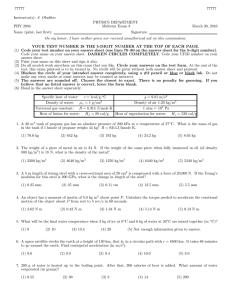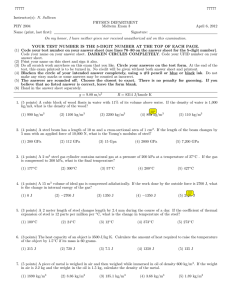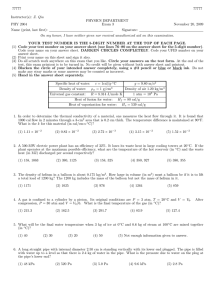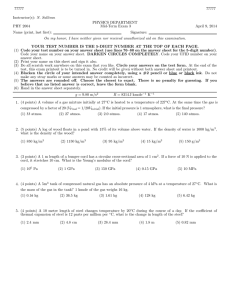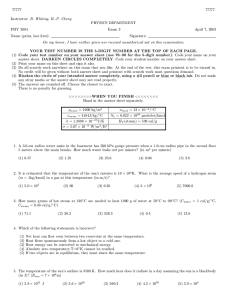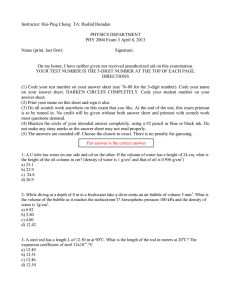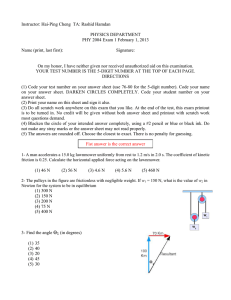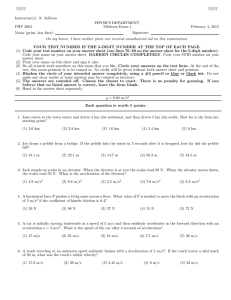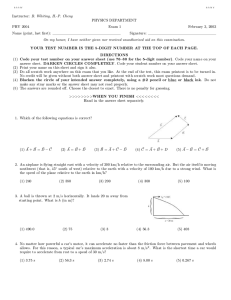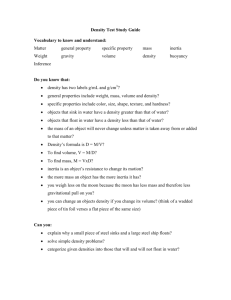77777 N. Sullivan PHYSICS DEPARTMENT PHY 2004
advertisement
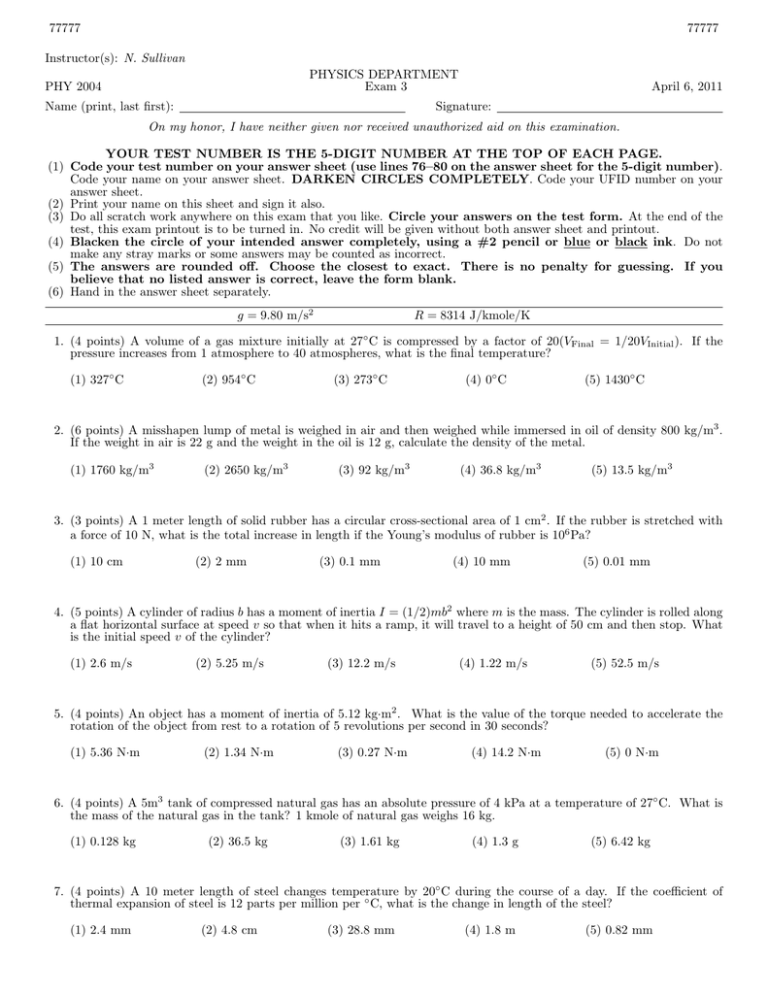
77777 77777 Instructor(s): N. Sullivan PHYSICS DEPARTMENT Exam 3 PHY 2004 Name (print, last first): April 6, 2011 Signature: On my honor, I have neither given nor received unauthorized aid on this examination. YOUR TEST NUMBER IS THE 5-DIGIT NUMBER AT THE TOP OF EACH PAGE. (1) Code your test number on your answer sheet (use lines 76–80 on the answer sheet for the 5-digit number). Code your name on your answer sheet. DARKEN CIRCLES COMPLETELY. Code your UFID number on your answer sheet. (2) Print your name on this sheet and sign it also. (3) Do all scratch work anywhere on this exam that you like. Circle your answers on the test form. At the end of the test, this exam printout is to be turned in. No credit will be given without both answer sheet and printout. (4) Blacken the circle of your intended answer completely, using a #2 pencil or blue or black ink. Do not make any stray marks or some answers may be counted as incorrect. (5) The answers are rounded off. Choose the closest to exact. There is no penalty for guessing. If you believe that no listed answer is correct, leave the form blank. (6) Hand in the answer sheet separately. g = 9.80 m/s2 R = 8314 J/kmole/K 1. (4 points) A volume of a gas mixture initially at 27◦ C is compressed by a factor of 20(VFinal = 1/20VInitial ). If the pressure increases from 1 atmosphere to 40 atmospheres, what is the final temperature? (1) 327◦ C (2) 954◦ C (3) 273◦ C (4) 0◦ C (5) 1430◦ C 2. (6 points) A misshapen lump of metal is weighed in air and then weighed while immersed in oil of density 800 kg/m3 . If the weight in air is 22 g and the weight in the oil is 12 g, calculate the density of the metal. (1) 1760 kg/m3 (2) 2650 kg/m3 (3) 92 kg/m3 (4) 36.8 kg/m3 (5) 13.5 kg/m3 3. (3 points) A 1 meter length of solid rubber has a circular cross-sectional area of 1 cm2 . If the rubber is stretched with a force of 10 N, what is the total increase in length if the Young’s modulus of rubber is 106 Pa? (1) 10 cm (2) 2 mm (3) 0.1 mm (4) 10 mm (5) 0.01 mm 4. (5 points) A cylinder of radius b has a moment of inertia I = (1/2)mb2 where m is the mass. The cylinder is rolled along a flat horizontal surface at speed v so that when it hits a ramp, it will travel to a height of 50 cm and then stop. What is the initial speed v of the cylinder? (1) 2.6 m/s (2) 5.25 m/s (3) 12.2 m/s (4) 1.22 m/s (5) 52.5 m/s 5. (4 points) An object has a moment of inertia of 5.12 kg·m2 . What is the value of the torque needed to accelerate the rotation of the object from rest to a rotation of 5 revolutions per second in 30 seconds? (1) 5.36 N·m (2) 1.34 N·m (3) 0.27 N·m (4) 14.2 N·m (5) 0 N·m 6. (4 points) A 5m3 tank of compressed natural gas has an absolute pressure of 4 kPa at a temperature of 27◦ C. What is the mass of the natural gas in the tank? 1 kmole of natural gas weighs 16 kg. (1) 0.128 kg (2) 36.5 kg (3) 1.61 kg (4) 1.3 g (5) 6.42 kg 7. (4 points) A 10 meter length of steel changes temperature by 20◦ C during the course of a day. If the coefficient of thermal expansion of steel is 12 parts per million per ◦ C, what is the change in length of the steel? (1) 2.4 mm (2) 4.8 cm (3) 28.8 mm (4) 1.8 m (5) 0.82 mm 77777 77777 Instructor(s): N. Sullivan PHYSICS DEPARTMENT Exam 3 PHY 2004 Name (print, last first): November 19, 2010 Signature: On my honor, I have neither given nor received unauthorized aid on this examination. YOUR TEST NUMBER IS THE 5-DIGIT NUMBER AT THE TOP OF EACH PAGE. (1) Code your test number on your answer sheet (use lines 76–80 on the answer sheet for the 5-digit number). Code your name on your answer sheet. DARKEN CIRCLES COMPLETELY. Code your UFID number on your answer sheet. (2) Print your name on this sheet and sign it also. (3) Do all scratch work anywhere on this exam that you like. Circle your answers on the test form. At the end of the test, this exam printout is to be turned in. No credit will be given without both answer sheet and printout. (4) Blacken the circle of your intended answer completely, using a #2 pencil or blue or black ink. Do not make any stray marks or some answers may be counted as incorrect. (5) The answers are rounded off. Choose the closest to exact. There is no penalty for guessing. If you believe that no listed answer is correct, leave the form blank. (6) Hand in the answer sheet separately. g = 9.80 m/s2 R = 8314 J/kmole/K 1. (4 points) In the compression chamber of a diesel engine the volume of a gas mixture initially at 27◦ C is compressed by a factor of 20(VFinal = 1/20VInitial ). If the pressure increases from 1 atmosphere to 50 atmospheres, what is the final temperature? (1) 477◦ C (2) 954◦ C (3) 273◦ C (4) 0◦ C (5) 1430◦ C 2. (5 points) A misshapen lump of metal is weighed in air and then weighed while immersed in oil of density 800 kg/m3 . If the weight in air is 2.2 kg and the weight in the oil is 1.2 kg, calculate the density of the metal. (1) 1760 kg/m3 (2) 2650 kg/m3 (3) 92 kg/m3 (4) 36.8 kg/m3 (5) 13.5 kg/m3 3. (4 points) A 5 meter length of steel with a cross-sectional area of 20 cm2 is compressed with a force of 20,000 N. If the Young’s modulus of steel is 200 × 109 N/m2 , what is the change in length of the steel beam? (1) 0.25 mm (2) 2.5 cm (3) 5.5 cm (4) 0.11 cm (5) 12.5 mm 4. (5 points) A cylinder of radius b has a moment of inertia I = (1/2)mb2 . The cylinder is rolled along a flat horizontal surface at speed v so that when it hits a ramp, it will travel to a height of 50 cm and then stop. What is the initial speed v of the cylinder? (1) 2.6 m/s (2) 5.25 m/s (3) 12.2 m/s (4) 1.22 m/s (5) 52.5 m/s 5. (4 points) An object has a moment of inertia of 2.56 kg·m2 . What is the value of the torque needed to accelerate the rotation of the object from rest to a rotation of 5 revolutions per second in 30 seconds? (1) 2.68 N·m (2) 1.34 N·m (3) 0.27 N·m (4) 4.02 N·m (5) 0 N·m 6. (4 points) A 5m3 tank of compressed helium gas has an absolute pressure of 4 kPa at a temperature of 27◦ C. What is the mass of the helium in the tank? 1 kmole of helium weighs 4 kg. (1) 33 g (2) 13.5 g (3) 1.61 kg (4) 0.35 kg (5) 6.42 kg 7. (4 points) A 100 meter length of steel changes temperature by 30◦ C during the course of a day. If the coefficient of thermal expansion of steel is 12 parts per million per ◦ C, what is the change in length of the steel? (1) 3.6 cm (2) 7.2 cm (3) 14.4 mm (4) 1.8 m (5) 0.18 cm 77777 77777 77777 77777 Instructor(s): N. Sullivan PHYSICS DEPARTMENT Midterm Exam 3 PHY 2004 Name (print, last first): November, 2011 Signature: On my honor, I have neither given nor received unauthorized aid on this examination. YOUR TEST NUMBER IS THE 5-DIGIT NUMBER AT THE TOP OF EACH PAGE. (1) Code your test number on your answer sheet (use lines 76–80 on the answer sheet for the 5-digit number). Code your name on your answer sheet. DARKEN CIRCLES COMPLETELY. Code your UFID number on your answer sheet. (2) Print your name on this sheet and sign it also. (3) Do all scratch work anywhere on this exam that you like. Circle your answers on the test form. At the end of the test, this exam printout is to be turned in. No credit will be given without both answer sheet and printout. (4) Blacken the circle of your intended answer completely, using a #2 pencil or blue or black ink. Do not make any stray marks or some answers may be counted as incorrect. (5) The answers are rounded off. Choose the closest to exact. There is no penalty for guessing. If you believe that no listed answer is correct, leave the form blank. (6) Hand in the answer sheet separately. g = 9.80 m/s2 R = 8134 J/kmole K ◦ 1. (4 points) A volume of gas initially at 37 C is compressed by a factor of 10 (VFinal = 1/10VInitial ). increases from 112 kPa to 1904 kPa, what is the final temperature? (1) 254◦ C (2) 855◦ C (3) 473◦ C (4) 0◦ C If the pressure (5) 1250◦ C 2. (5 points) A small piece of rock is weighed in air and then weighed while immersed in oil of density 800 kg/m3 . If the weight in air is 21.5 N and the weight in the oil is 11.8 N, calculate the density of the rock. (1) 1750 kg/m3 (2) 202.7 kg/m3 (3) 1.38 kg/m3 (4) 13.68 kg/m3 (5) 9710 kg/m3 3. (4 points) A 15 meter length of steel with a cross-sectional area of 20 cm2 is compressed with a force of 10,000 N. If the Young’s modulus of steel is 200 × 109 N/m2 , what is the change in length of the steel beam? (1) 0.38 mm (2) 2.3 cm (3) 4.47 mm (4) 0.19 cm (5) 12.5 mm 4. (4 points) A 10m3 tank of compressed natural gas has an absolute pressure of 400 kPa at a temperature of 27◦ C. What is the mass of the gas in the tank? 1 kmole of natural gas weighs 16 kg. R = 8134 J/kmole K. (1) 25.6 kg (2) 288 g (3) 196 g (4) 16.1 kg (5) 642 kg 5. (4 points) A 200 meter length of steel rail changes temperature by 30◦ C during the course of a day. If the coefficient of thermal expansion of steel is 12 parts per million per ◦ C, what is the change in length of the steel? (1) 72 mm (2) 1.44 cm (3) 14.4 mm (4) 1.8 m (5) 3.66 mm 6. (3 points) How much water at 0◦ C is required to cool a 200 kg human by 1◦ C. The heat capacity of the human body is 3500 J/kg/K and the heat capacity of water is 4184 J/kg/K. (1) 167 kg (2) 239 kg (3) 83.5 kg (4) 23.9 kg (5) 200 kg 7. (3 points) An engine operating in an ideal Carnot cycle involves an isothermal compression of 2 m3 of helium gas at 200◦ C and an isothermal compression of the gas at 50◦ C. What is the efficiency of this engine? (1) 31.7% (2) 75% (3) 100% (4) 63.4% (5) 87% 8. (4 points) A steel cylinder contains helium gas at a gauge pressure of 100 kPa and at a temperature of 27◦ C. The gas is heated and moves a piston in the cylinder 8 cm with the pressure held constant. If the area of the piston is 150 cm2 and the mass is 7 kg, calculate the work done by the gas. (1) 120 J (2) 1200 J (3) 256 J (4) 2560 J (5) 0 J 77777 77777 77777 77777 Instructor(s): N. Sullivan PHYSICS DEPARTMENT Midterm Exam 3 PHY 2004 April 6, 2012 Signature: Name (print, last first): On my honor, I have neither given nor received unauthorized aid on this examination. YOUR TEST NUMBER IS THE 5-DIGIT NUMBER AT THE TOP OF EACH PAGE. (1) Code your test number on your answer sheet (use lines 76–80 on the answer sheet for the 5-digit number). Code your name on your answer sheet. DARKEN CIRCLES COMPLETELY. Code your UFID number on your answer sheet. (2) Print your name on this sheet and sign it also. (3) Do all scratch work anywhere on this exam that you like. Circle your answers on the test form. At the end of the test, this exam printout is to be turned in. No credit will be given without both answer sheet and printout. (4) Blacken the circle of your intended answer completely, using a #2 pencil or blue or black ink. Do not make any stray marks or some answers may be counted as incorrect. (5) The answers are rounded off. Choose the closest to exact. There is no penalty for guessing. If you believe that no listed answer is correct, leave the form blank. (6) Hand in the answer sheet separately. g = 9.80 m/s2 R = 8314 J/kmole K 1. (5 points) A cubic block of wood floats in water with 11% of its volume above water. If the density of water is 1,000 kg/m3, what is the density of the wood? (1) 990 kg/m3 (2) 1100 kg/m3 (3) 2200 kg/m3 (4) 890 kg/m3 (5) 110 kg/m3 2. (4 points) A steel beam has a length of 10 m and a cross-sectional area of 1 cm2 . If the length of the beam changes by 5 mm with an applied force of 10,000 N, what is the Young’s modulus of steel? (1) 200 GPa (2) 112 GPa (3) 15 Gpa (4) 2000 GPa (5) 7,200 GPa 3. (4 points) A 2 m3 steel gas cylinder contains natural gas at a pressure of 200 kPa at a temperature of 27◦ C . If the gas is compressed to 300 kPa, what is the final temperature? (1) 177◦ C (2) 300◦ C (3) 57◦ C (4) 200◦ C (5) 427◦ C 4. (4 points) A 15 m3 volume of ideal gas is compressed adiabatically. If the work done by the outside force is 2700 J, what is the change in internal energy of the gas? (1) 0 J (2) −2700 J (3) 1350 J (4) −1350 J (5) 2700 J 5. (3 points) A 2 meter length of steel changes length by 2.4 mm during the course of a day. If the coefficient of thermal expansion of steel is 12 parts per million per ◦ C, what is the change in temperature of the steel? (1) 100◦ C (2) 24◦ C (3) 12◦ C (4) 373◦ C (5) 273◦ C 6. (3 points) The heat capacity of an object is 3500 J/kg K. Calculate the amount of heat required to raise the temperature of the object by 1.5◦ C if its mass is 60 grams. (1) 315 J (2) 720 J (3) 7.5 J (4) 1350 J (5) 125 J 7. (5 points) A piece of metal is weighed in air and then weighed while immersed in oil of density 600 kg/m3 . If the weight in air is 2.2 kg and the weight in the oil is 1.5 kg, calculate the density of the metal. (1) 1890 kg/m3 (2) 8.86 kg/m3 (3) 135.1 kg/m3 (4) 3.68 kg/m3 (5) 1.89 kg/m3 77777 77777 Instructor(s): Z. Qiu PHYSICS DEPARTMENT Exam 3 PHY 2004 Name (print, last first): April 7, 2010 Signature: On my honor, I have neither given nor received unauthorized aid on this examination. YOUR TEST NUMBER IS THE 5-DIGIT NUMBER AT THE TOP OF EACH PAGE. (1) Code your test number on your answer sheet (use lines 76–80 on the answer sheet for the 5-digit number). Code your name on your answer sheet. DARKEN CIRCLES COMPLETELY. Code your UFID number on your answer sheet. (2) Print your name on this sheet and sign it also. (3) Do all scratch work anywhere on this exam that you like. Circle your answers on the test form. At the end of the test, this exam printout is to be turned in. No credit will be given without both answer sheet and printout. (4) Blacken the circle of your intended answer completely, using a #2 pencil or blue or black ink. Do not make any stray marks or some answers may be counted as incorrect. (5) The answers are rounded off. Choose the closest to exact. There is no penalty for guessing. (6) Hand in the answer sheet separately. Young modulus of steel Density of water Volume expansion coefficient of benzene Specific heat of water Heat of fusion for water Heat of vaporization for water 1 atm = 100 kPa 200 GPa 1 g/cm3 β = 1.24 × 10−3 /◦ C c = 1 cal/g·◦ C Hf = 80 cal/g Hv = 539 cal/g 1. A steel girder has a cross-sectional area of 50 cm2 . How large a tensile force would be required to lengthen the girder by 0.03 percent (in N)? (1) 3.0 × 105 (2) 2.5 × 105 (3) 3.5 × 105 (4) 4.0 × 105 (5) 4.5 × 105 2. A certain piece of metal weighs 1.68 N in air and 0.77 N when submerged in water. What is the mass density of the metal (in g/cm3 )? (1) 1.85 (2) 2.37 (3) 2.54 (4) 2.93 (5) 2.18 3. A gas is confined to a cylinder by a piston. Its original conditions are P = 3 atm, T = 20◦ C and V = V0 . compression, P = 30 atm and V = V0 /6. What is the final temperature of the gas (in ◦ C)? (1) 215.3 (2) 162.5 (3) 291.7 (4) 83.9 After (5) 127.4 4. A certain amount of benzene occupies 500 cm3 at 10◦ C. What will its volume be at 35◦ C (in cm3 )? (1) 516 (2) 527 (3) 504 (4) 510 (5) 518 5. A 2.50 cm internal diameter pipe is standing vertically with its lower end plugged. The pipe is filled with water up to a level so that there is 1200 g of water in the pipe. What is the pressure of the water on the plug at the pipe’s lower end? (1) 24 kPa (2) 240 Pa (3) 2.5 Pa (4) 4.8 Pa (5) 1.4 Pa 77777 77777 6. In order to determine the thermal conductivity of a material, one measures the heat flow through it. It is found that 1000 cal flow in 2 minutes through a 3-cm2 area that is 0.2 cm thick. The temperature difference is maintained at 90◦ F. What is the k for this material (in cal/cm·s·◦ C)? (1) 1.11 × 10−2 (2) 0.82 × 10−2 (3) 2.72 × 10−3 (4) 3.15 × 10−2 (5) 1.52 × 10−2 7. A 500-MW electric power plant has an efficiency of 32%. It loses its waste heat in large cooling towers at 20◦ C. If the plant operates at the maximum possible efficiency, what are the temperature of the hot reservoir (in ◦ C) and the waste heat (in MJ) discharged per second respectively? (1) 158, 1063 (2) 380, 1125 (3) 158, 325 (4) 380, 927 (5) 380, 355 8. What will be the final water temperature when 3 kg of ice at 0◦ C and 0.6 kg of steam at 100◦ C are mixed together (in ◦ C)? (1) 40 (2) 30 (3) 20 (4) 50 (5) Not enough information given to answer. 9. The filament temperature of a light bulb is 900◦ C when the bulb delivers 40 W of power. If its emissivity remains constant, what power (in W) is delivered when the filament temperature is 1300◦ C? (1) 129 (2) 155 (3) 102 (4) 92 (5) 65 10. An ideal gas is confined to a vertical cylinder by a 3 kg piston. When 3 cal of heat is added to the gas, the piston lifts 20 cm. The change in internal energy of the gas is (in J) (1) 6.67 (2) 5.24 (3) 4.19 (4) 8.21 (5) 2.94 77777 77777 Instructor(s): Z. Qiu PHYSICS DEPARTMENT Exam 3 PHY 2004 Name (print, last first): November 20, 2009 Signature: On my honor, I have neither given nor received unauthorized aid on this examination. YOUR TEST NUMBER IS THE 5-DIGIT NUMBER AT THE TOP OF EACH PAGE. (1) Code your test number on your answer sheet (use lines 76–80 on the answer sheet for the 5-digit number). Code your name on your answer sheet. DARKEN CIRCLES COMPLETELY. Code your UFID number on your answer sheet. (2) Print your name on this sheet and sign it also. (3) Do all scratch work anywhere on this exam that you like. Circle your answers on the test form. At the end of the test, this exam printout is to be turned in. No credit will be given without both answer sheet and printout. (4) Blacken the circle of your intended answer completely, using a #2 pencil or blue or black ink. Do not make any stray marks or some answers may be counted as incorrect. (5) Hand in the answer sheet separately. Specific heat of water: c = 1cal/g·◦ C g = 9.80 m/s2 Density of water: ρw = 1 g/cm3 Density of air 1.20 kg/m3 Universal gas constant: R = 8.314 J/mole K 1 atm = 105 Pa Heat of fusion for water: Hf = 80 cal/g Heat of vaporization for water: Hv = 539 cal/g 1. In order to determine the thermal conductivity of a material, one measures the heat flow through it. It is found that 1000 cal flow in 2 minutes through a 3-cm2 area that is 0.2 cm thick. The temperature difference is maintained at 90◦ F. What is the k for this material (in cal/cm·s·◦ C)? (1) 1.11 × 10−2 (2) 0.82 × 10−2 (3) 2.72 × 10−3 (4) 3.15 × 10−2 (5) 1.52 × 10−2 2. A 500-MW electric power plant has an efficiency of 32%. It loses its waste heat in large cooling towers at 20◦ C. If the plant operates at the maximum possible efficiency, what are the temperature of the hot reservoir (in ◦ C) and the waste heat (in MJ) discharged per second respectively? (1) 158, 1063 (2) 380, 1125 (3) 158, 325 (4) 380, 927 (5) 380, 355 3. The density of helium in a balloon is about 0.175 kg/m3 . How large in volume (in m3 ) must a balloon be if it is to lift a total load of 1200 kg? The 1200 kg includes the mass of the balloon but not the mass of helium in it. (1) 1171 (2) 1025 (3) 976 (4) 1264 (5) 859 4. A gas is confined to a cylinder by a piston. Its original conditions are P = 3 atm, T = 20◦ C and V = V0 . compression, P = 30 atm and V = V0 /6. What is the final temperature of the gas (in ◦ C)? (1) 215.3 (2) 162.5 (3) 291.7 (4) 83.9 After (5) 127.4 5. What will be the final water temperature when 3 kg of ice at 0◦ C and 0.6 kg of steam at 100◦ C are mixed together (in ◦ C)? (1) 40 (2) 30 (3) 20 (4) 50 (5) Not enough information given to answer. 6. A long straight pipe with internal diameter 2.50 cm is standing vertically with its lower end plugged. The pipe is filled with water up to a level so that there is 2.4 kg of water in the pipe. What is the pressure due to water on the plug at the pipe’s lower end? (1) 48 kPa (2) 520 Pa (3) 5.0 Pa (4) 9.6 kPa (5) 2.8 Pa 77777 77777 7. A 1.5 m3 -volume tank holds oxygen gas (M = 32 g/mole) at the pressure of 500,000 Pa. The temperature is 27◦ C. Find the mass of oxygen in the tank (in kg). (1) 9.62 (2) 7.45 (3) 91.2 (4) 13.24 (5) 45.7 8. A ice chest is maintained at 0◦ C by ice placed in it. The chest has a total surface area of 600 cm2 and a thickness of 1 cm. The wall of the ice chest is of Styrofoam with thermal conductivity k = 2.3 × 10−4 cal/(cm s◦ C). How much ice will melt in the chest in 4 hours when the outside temperature is 20◦ C (in g)? (1) 500 (2) 250 (3) 375 (4) 600 (5) none of these 9. A wood block floats on water with 35% of its volume above the surface (of water), what is the average density of the block (in kg/m3 )? (1) 650 (2) 720 (3) 1300 (4) 362 (5) 830 10. The filament temperature of a light bulb is 900◦ C when the bulb delivers 40 W of power. If its emissivity remains constant, what power (in W) is delivered when the filament temperature is 1300◦ C? (1) 129 (2) 155 (3) 102 (4) 92 (5) 65
